Text
Elf names got more complicated as parents strove to create new ones instead of handling the political whiplash of reusing an old one. So if you meet an elf called ‘silver-river-water-voice’ they’re pretty young, but if some guy says ‘hi I’m Tree’ you best believe that bitch is ancient.
3K notes
·
View notes
Text
The next story I am Definitely Not Writing: a fic where Legolas and Gimli make it all the way to the Undying Lands before they realize that in addition to loving each other more than anything else in all of Arda, they are also in love with one another (this is less a realization on their part and more an assumption that just about everyone else in Aman makes on sight, and eventually they hear about it and go oh...dang...maybe...? and Legolas's mom facepalms forever) and hey what if they got married, then...?
Only the thing is, while an elvish marriage is very simple and requires literally nothing but the folks involved deciding to do it (and no, Thranduil is not allowed to demand that Gimli fetch some priceless jewel from the Fëanorian section of Tirion in order to prove himself worthy of Legolas's hand, although he tried very very hard to convince everyone that it was a great idea) a dwarven marriage is an elaborate ceremony, requiring the participation of both a dwarven officiant and several members of one's kin to perform the various elements of the ceremony.
...all of which are in short supply in this land of elves and valar.
Except. well. there aren't any other dwarves in Aman...but what there is, is the guy who made the dwarves. And he is VERY fond of Gimli. So when he learns that Gimli is kind of moping about the fact that he can't marry Legolas in dwarven-fashion, Aulë ENTHUSIASTICALLY volunteers to be the officiant and to set everything up and arrange just the BEST DWARVEN WEDDING EVER...
Because, you know. he's never actually been to one?
Gimli is stricken with horrified shock to realize just how much his own Maker has missed out on interactions with his beloved dwarves over the years, and immediately agrees to this plan (even though he knows it won't be a real dwarven wedding without his family there; but he'll swim back to Middle-earth before he says one word about that anywhere that Mahal can hear! he is going to do everything in his power to make this the best wedding ever for the sake of his Maker, dammit!).
So he gets to work crafting all the necessary accoutrements (with enthusiastic help from Celebrimbor and all his other elf-smith friends that Gimli has acquired since coming to these shores which is, let's be honest, quite a few) and carefully teaching Legolas all the necessary Khuzdul phrases and ceremonial steps that they can do to mimic as much of a proper wedding as they can without anyone else to help...
And when the big day comes, Aulë is vibrating so hard he's on the verge of setting off seventeen different earthquakes across the island, and not even Yavanna can get him to relax. Gimli and Legolas arrive to the appointed place, and find that they aren't alone: Aul�� has invited Celebrimbor, too, seeing as he's the only elf in Aman who has actually participated in a dwarven wedding before with makes him the local expert as well as the closest thing to "kin" that Gimli is going to find on these shores...except.
Well, Mandos might be in charge of elvish souls, but dwarves? They belong to their Maker. And if Mahal decides he wants to...well, who is going to stop him from waking some of them up early, before the breaking of the world? Especially if he doesn't ask permission first. So when Gimli and Legolas hesitantly walk into this foreboding stone chamber, eerily close to the Halls of Mandos, wondering wtf is going on and have they offended the valar somehow and are they in trouble and if so how bad is it...?
Well, turns out Gimli will have kin at his wedding after all.
Mahal can't bring any of them back to life, not without the intervention and permission of Eru and probably Mandos too; but as long as they're in his halls, he can wake anybody he wants. So soon there is a great crowd of bewildered but enthusiastic dwarves gathered around Gimli, as he tries to explain what the heck is going on to a whole passel of relatives and friends, some of whom died even before the Lonely Mountain was reclaimed and don't even know how the Battle of Five Armies ended, let alone the whole thing with the Ring and the Fellowship...
And Legolas and Celebrimbor are standing near the entrance watching fondly, Legolas weeping around a great big smile and Celebrimbor torn between joy for Gimli and his own ever-bitter sorrows and then...
"Khelebrrimbor?" calls a deep dwarven voice, in a thick Khuzdul accent, and Celebrimbor stiffens like he's just been shot.
Suddenly there's a ruckus as a very burly dwarf is shouldering through the crowd, and Celebrimbor stumbles forward and throws himself at Narvi with a wail, and it's at least ten minutes before anyone can get a coherent word out of either of them (although it takes considerably less time to catch the gist of Narvi's lecture about how dare you and lucky he's already dead, or I'd have a gift for him he wouldn't forget in a hurry and what were you thinking???).
Legolas gives Aulë a very pointed raise of his eyebrows, and Aulë shrugs around an unabashed grin. "Who in all the ages of the world is more of an expert on marriages between elves and dwarves than the two of them? I am a craftsman, Greenleaf; of course I would want to make use of their skills and experience in this endeavor. Nothing more to it than that."
Legolas hums noncommittally, but his eyes are dancing.
Mahal ignores him and steps forward to start the wedding. It takes even him three tries before he can shout loud enough to be heard over the tumult and get everyone's attention, but eventually he gets them all to quiet down enough for the ceremony to begin. Not everyone in attendance is entirely thrilled by the prospect of Gimli marrying an elf (that elf) but no one is so cross that they walk back into their dreams of stone to avoid it, which Gimli chalks up as a victory.
(Legolas's terrible Khuzdul pronunciation doesn't help, but the very enthusiastic way he praises Gimli when the ceremony reaches that point makes up for a lot. By the time he finally runs out of words, a few of the more recalcitrant attendees have changed their tune about him. The fact that he's so good at weaving the required braids doesn't hurt, either.)
There aren't nearly enough refreshments for a crowd that size afterwards, of course, since Gimli and Legolas weren't expecting anyone but themselves and Aulë to be there; but that doesn't much matter, because 90% of those in attendance don't have the sort of corporealness that would allow them to eat the dwarven delicacies that Gimli spent all morning fussing over anyway. (That doesn't stop some of his more elderly relatives from scolding him for not following their recipes better.) They're solid enough that you can hug them or kiss them, in the case of a certain former smithlord of Eregion or get half-knocked off your feet by their congratulatory backslaps, but they aren't alive. They're still the dreaming dead...it's just that for the moment, they're dreaming in a bit more wakefulness than usual.
In the end it's not what one would call an orthodox dwarven wedding, no; but it's a lot closer than Gimli thought he would get, and since he's hardly an orthodox dwarf, the small tweaks and oddities of their strange situation don't bother him in the slightest.
As for Aulë, he's never been happier.
And if it takes a long, long time for Celebrimbor to finally leave (and if he tries to devise a way to prop the door open on his way out)...well, Aulë is enjoying himself far too much to do anything but pretend not to notice. Even when Námo clears his throat at him very pointedly.
Twice.
And then again. And again.
"Aulë...!"
244 notes
·
View notes
Text
13 notes
·
View notes
Text
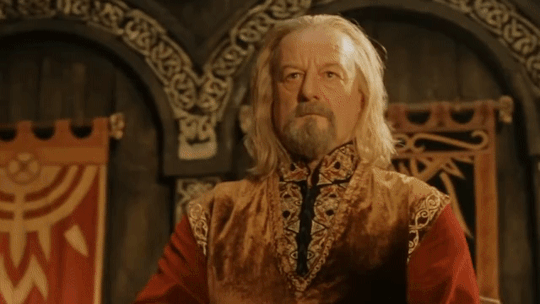
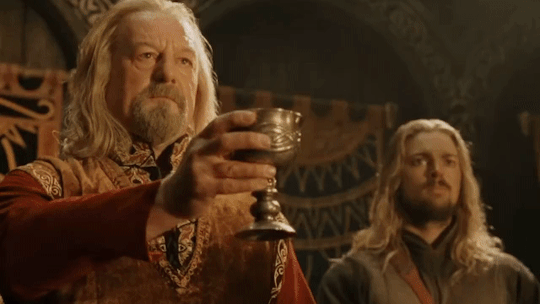

Tonight, we remember one who lent his enormous talent to telling the story we have all come to love. Hail, the victorious dead!
May the Simbelmynë cover his tomb as it did the tomb of the one he so accurately portrayed.
Bernard Hill Dec 17, 1944 - May 5, 2024
19K notes
·
View notes
Text
It puzzles me when people cite LOTR as the standard of “simple” or “predictable” or “black and white” fantasy. Because in my copy, the hero fails. Frodo chooses the Ring, and it’s only Gollum’s own desperation for it that inadvertently saves the day. The fate of the world, this whole blood-soaked war, all the millennia-old machinations of elves and gods, comes down to two addicts squabbling over their Precious, and that is precisely and powerfully Tolkien’s point.
And then the hero goes home, and finds home a smoking desolation, his neighbors turned on one another, that secondary villain no one finished off having destroyed Frodo’s last oasis not even out of evil so much as spite, and then that villain dies pointlessly, and then his killer dies pointlessly. The hero is left not with a cathartic homecoming, the story come full circle in another party; he is left to pick up the pieces of what was and what shall never be again.
And it’s not enough. The hero cannot heal, and so departs for the fabled western shores in what remains a blunt and bracing metaphor for death (especially given his aged companions). When Sam tells his family, “Well, I’m back” at the very end, it is an earned triumph, but the very fact that someone making it back qualifies as a triumph tells you what kind of story this is: one that is too honest to allow its characters to claim a clean victory over entropy, let alone evil.
“I can’t recall the taste of food, nor the sound of water, nor the touch of grass. I’m naked in the dark. There’s nothing–no veil between me and the wheel of fire. I can see him with my waking eyes.”
So where’s this silly shallow hippie fever-dream I’ve heard so much about? It sounds like a much lesser story than the one that actually exists.
90K notes
·
View notes
Text
Okay I'm almost done with Fellowship, here's an incomplete list of shit I noticed and thought was buck fucking wild on my first ever read-thru: medieval edition.
In literally the second line of the book, Tolkien implies that Bilbo Baggins wrote a story which was preserved alongside the in-universe version of the Mabinogion (aka the best-known collection of Welsh myths; I promise this is batshit). This is because The Hobbit has been preserved, in Tolkien's AU version of our world, in a "selection of the Red Book of Westmarch" (Prologue, Concerning Hobbits). If you're a medievalist and you see something called "The Red Book of" or "The Black Book of" etc it's a Thing. In this case, a cheeky reference to the Red Book of Hergest (Llyfr Coch Hergest). There are a few Red Books, but only Hergest has stories).
not a medieval thing but i did not expect one common theory among hobbits for the death of Frodo's parents to be A RUMORED MURDER-SUICIDE.
At the beginning of the book a few hobbits report seeing a moving elm tree up on the moors, heading west (thru or past the Shire). I mentioned this in another post, but another rule: if you see an elm tree, that's a Girl Tree. In Norse creation myth, the first people were carved from driftwood by the gods. Their names were Askr (Ash, as in the tree), the first man, and Embla (debated, but likely elm tree), the first woman. A lot of ppl have I think guessed that that was an ent-wife, but like. Literally that was a GIRL. TREE.
Medieval thing: I used to read the runes on the covers of The Hobbit and LOTR for fun when I worked in a bookshop. There's a mix of Old Norse (viking) and Old English runes in use, but all the ones I've noticed so far are real and readable if you know runes.
Tom Bombadil makes perfect sense if you once spent months of your life researching the early medieval art of galdor, which was the use of poems or songs to do a form of word-magic, often incorporating gibberish. If you think maybe Tolkien did not base the entirety of Fellowship so far around learning and using galdor and thus the power of words and stories, that is fine I cannot force you. He did personally translate "galdor" in Beowulf as "spell" (spell, amusingly, used to mean "story"). And also he named an elf Galdor. Like he very much did name an elf Galdor.
Tom Bombadil in fact does galdor from the moment we meet him. He arrives and fights the evil galdor (song) of the willow tree ("old gray willow-man, he's a mighty singer"), which is singing the hobbits to sleep and possibly eating them, with a galdor (song) of his own. Then he wanders off still singing, incorporating gibberish. I think it was at this point that I started clawing my face.
THEN Tom Bombadil makes perfect sense if you've read the description of the scop's songs in Beowulf (Beowulf again, but hey, Tolkien did famously a. translate it b. write a fanfiction about it called Sellic Spell where he gave Beowulf an arguably homoerotic Best Friend). The scop (pronounched shop) is a poet who sings about deeds on earth, but also by profession must know how to sing the song or tell the story of how the cosmos itself came to be. The wise-singer who knows the deep lore of the early universe is a standard trope in Old English literature, not just Beowulf! Anyway Tom Bombadil takes everyone home and tells them THE ENTIRE STORY OF ALL THE AGES OF THE EARTH BACKWARDS UNTIL JUST BEFORE THE MOMENT OF CREATION, THE BIG BANG ITSELF and then Frodo Baggins falls asleep.
Tom Bombadil knows about plate tectonics
This is sort of a lie, Tom Bombadil describes the oceans of old being in a different place, which works as a standard visual of Old English creation, which being Christian followed vaguely Genesis lines, and vaguely Christian Genesis involves a lot of water. TOLKIEN knew about plate tectonics though.
Actually I just checked whether Tolkien knew about plate tectonics because I know the advent of plate tectonics theory took forever bc people HATED it and Alfred Wegener suffered for like 50 years. So! actually while Tolkien was writing LOTR, the scientific community was literally still not sure plate tectonics existed. Tom Bombadil knew tho.
Remember that next time you (a geologist) are forced to look at the Middle Earth map.
I'm not even done with Tom Bombadil but I'm stopping here tonight. Plate tectonics got me. There's a great early (but almost high!) medieval treatise on cosmology and also volcanoes and i wonder if tolkien read it. oh my god. i'm going to bed.
edit: part II
3K notes
·
View notes
Photo



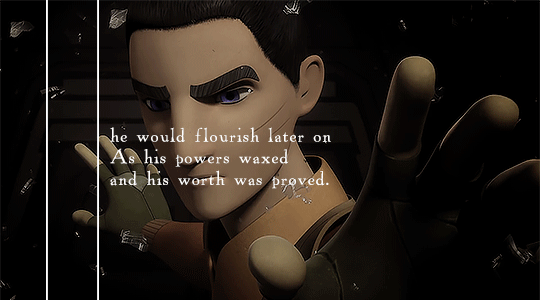

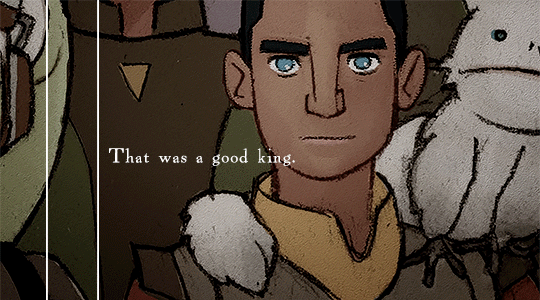
—The recounting of Shield Sheafson’s deeds from Beowulf, adapted for Ezra Bridger from Star Wars: Rebels
There was Shield Sheafson Ezra Bridger, scourge of many tribes the Empire
A wrecker of mead-benches star-destroyers, rampaging among foes.
This terror of the hall- storm-troops had come far.
A foundling to start with, he would flourish later on
As his powers waxed and his worth was proved
In the end each clan sky-conquerer on the outlying coasts
Beyond the whale-roads had to yield to him
And begin to pay tribute. That was a good king.
2K notes
·
View notes
Text
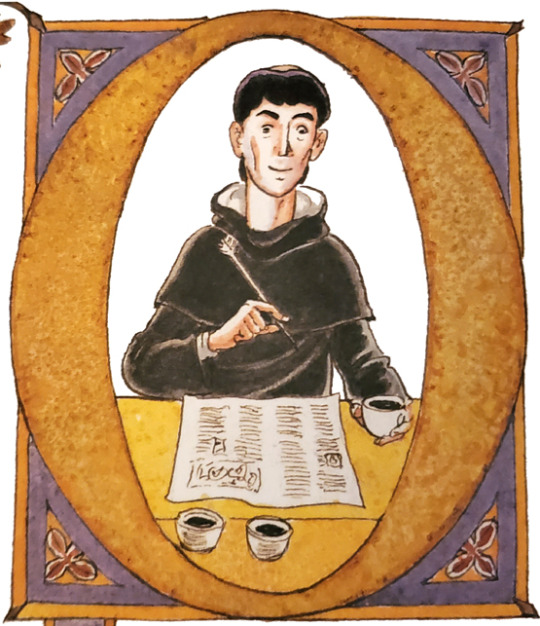
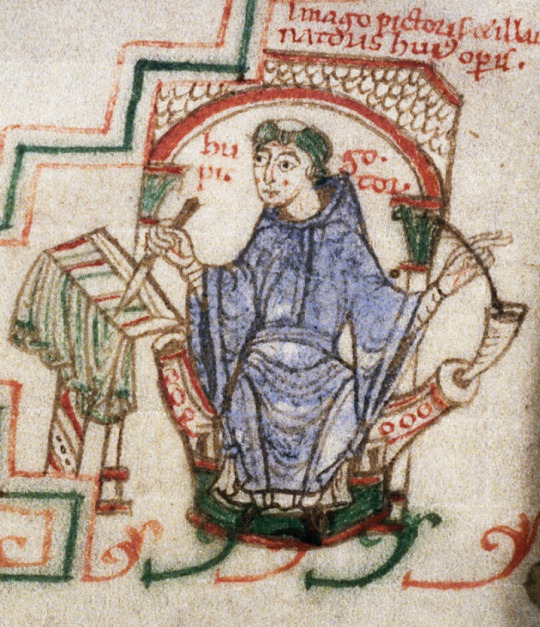

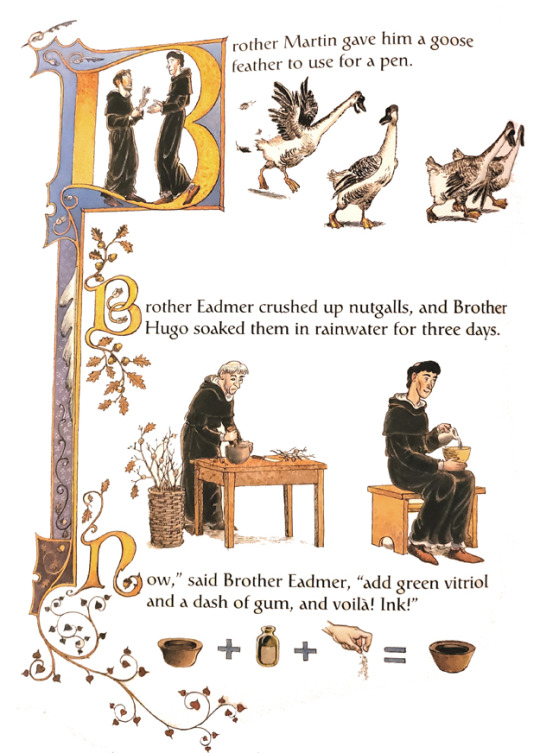
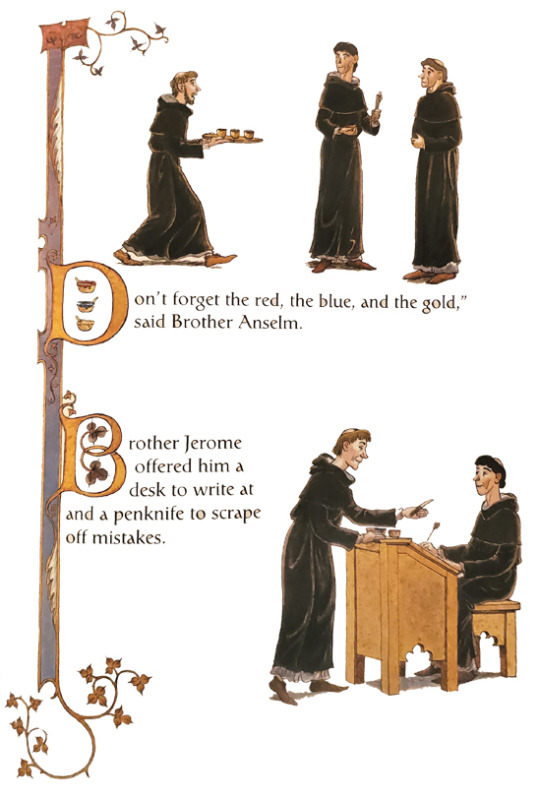
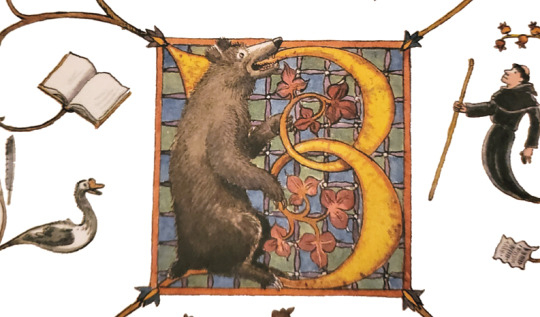
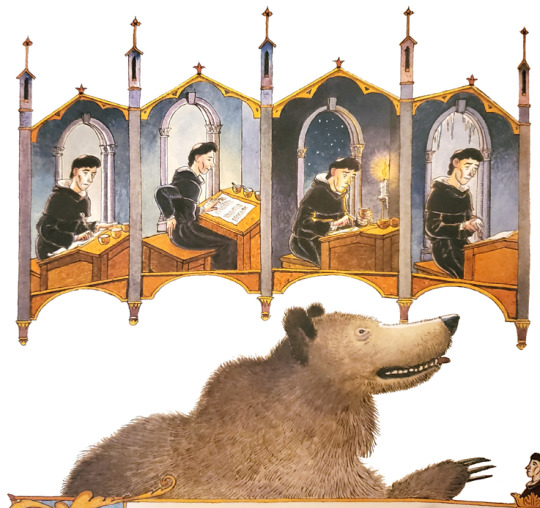
Some of the beautiful illustrations by S.D. Schindler from Brother Hugo and the Bear by Katy Beebe.
The book is based on two real medieval figures: Hugo, a scribe who added a self-portrait (pictured above) to the end of his copy of Jerome's Commentaries on Isaiah, and a bear who appears in a letter from the abbot of Cluny Abbey to a neighboring abbot asking to borrow a copy of The Letters of St. Augustine, "for a large part of ours has been accidentally eaten by a bear."
2K notes
·
View notes
Text
I don't know if this was obvious to everyone else, but I just realised that one of the reasons why the Hobbit is so effective as a children's book is that while Bilbo is an adult, the skills that make him a hero are all those of a child.
By human standards he's child-sized, which makes him unobtrusive and light on his feet. He can slip by unnoticed where bigger people can't.
He's good at playing games, and even cheats (successfully!) in a way that - let's face it - is not so different to how children try to cheat at games. He's polite in a way that's fully comprehensible to children (rather than, say, being able to perform courtly manners). He's quick-witted, but the trick of keeping the trolls talking is also one that would be achievable for a child.
He doesn't have magic powers, he's not a great fighter, and he's not some kind of Chosen One. There's not much that he does that couldn't be done by a ten-year-old, but the story shows just how valuable all those skills and traits are. It's very empowering.
17K notes
·
View notes
Text
WHERE NOW THE HORSE AND THE RIDER-Aka how I just had a Tolkien related freak out on the train
I can't believe what just happened to me. As in, it's such a weird chain of events that it has left me a little dizzy.
I was reading "Les Nourritures Terrestres" by Gide, and I got to a point he cites parts of a poem which I liked very much. The notes informed me that it's a French translation of "an 8th century saxon elegy called 'The Wanderer' "
That intrigued me, and, being on a train with a lot of time to pass (plus being a little tired of reading in French), I took out my phone and searched for the poem.
I found it here. It's the lament of a warrior in exile who has lost his lord and mourns the joy and glory of a world that has now disappeared. I was enjoying it a lot.
And then I got to this point:
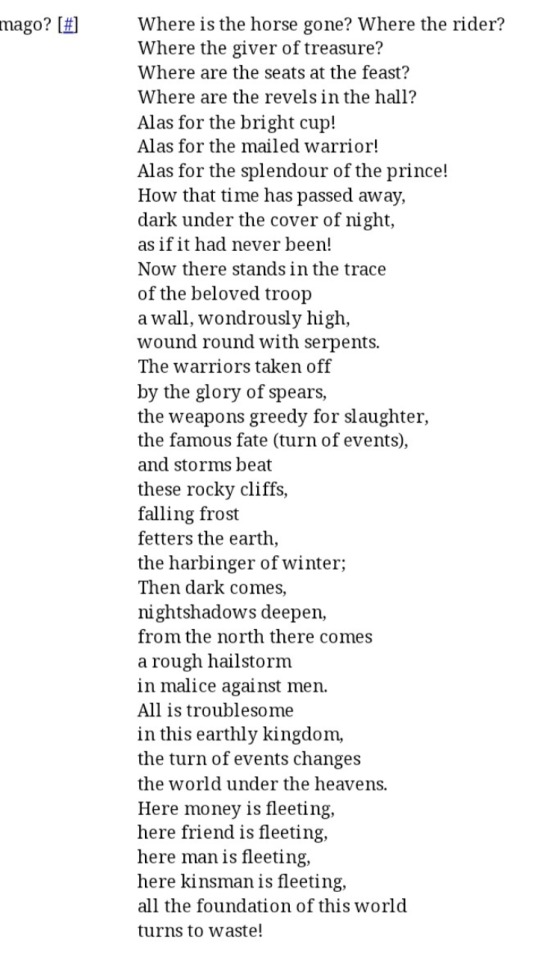
And my mouth actually dropped open, because what?
Are you telling me that the Lament for the Rohirrim, one of my favourite poems in LOTR, which I learnt by heart at 13 and later took care to learn in the original English, which I sing when I do the dishes and which routinely makes me cry, is Tolkien's translation of an 8th century Saxon elegy?
Well, the notes at the end of the page confirmed it:

"Tolkien's rendition is hard to resist" I bet it is. I love that professional philologists add notes to their work saying "yeah, by the way, this bit here? It's in your favourite fantasy novel, and I am kinda jealous of how well it was translated, but it's Tolkien, the man spoke Old English, what can you do? Carry on, xoxo"
I mean, I had gathered that the Tolkien poem played on themes used in medieval literature, but I had no idea it was based on an actual, specific text. That makes it a hundred times cooler!
Maybe it's common knowledge, but it was a delicious tidbit of good news to me. Especially since I wasn't expecting it in the least, so I was blindsided by it.
Cherry on top? I had ignored the Old English text, since I don't understand it, but at the end I gave it a cursory read , and the line "Alas for the splendor of the prince"? "Eala þeodnes þrym!"
Now, I have never studied Old English, but I know roughly how to pronounce it (what kind of Silmarillion fan would I be if I didn’t recognize the thorn?). þeodnes has to be where "Theoden" comes from, right?
Apparently yes. I googled the "Lament for the Rohirrim", and Tolkien Gathaway has a nice little parapraph in which they explain all this. I don't know why I had never read it before, but it was a lot more fun learning it as an unexpected detour from my French practice, not gonna lie.
Bottom line: Tolkien was a both a nerd and a genius and continues to make my life brighter, and this is one of those moments in which I am very happy I have spent years of my life learning languages.
Thanks for coming to my impromptu TedTalk.
2K notes
·
View notes
Note
jstor my beloved
For thee who seeks in JSTOR's boundless troves,
Where knowledge's streams in quiet wisdom flow,
Each page a world, each article bestows
The light of erudite scholars aglow.
In digital realms, where past and present merge,
Thy quest for understanding never tires,
Through ancient texts and modern surges,
Fueling the heart with scholarly desires.
O valiant seeker of the truths untold,
In JSTOR's garden, wisdom's fruits are ripe.
Thy mind, a vessel, eager to behold
The secrets held in every archetype.
So sail on, through academic seas so vast,
In JSTOR's embrace, thy thirst quenched at last.
212 notes
·
View notes
Text
I know people like to say that the reason Pippin was overly familiar with Denethor was just because of a difference in dialect, but personally I like to think that when Pippin heard ‘Steward of Gondor’ he went, “oh, like the Thain of the Shire” and proceeded to talk to him the way he’d talk to the Thain—which is to say, politely, but like an equal
18K notes
·
View notes
Text
So one day a dwarf is talking to a human and finally realizes that when humans say woman, they generally mean “person who is theoretically capable of childbirth” because for whatever reason, humans assign social expectations based genital differences. (What a fucked up culture, the dwarf thinks.) But hey, better communication! So the next time the dwarf introduces theirself, they say, oh, by the way, I am what you call a “woman.”
And the trade negotiations just stop. They just stop cold. The tall people insist on speaking to the man, they insist on talking to the lady dwarf about all sorts of irrelevant bullshit, like recipes and childrearing and perfume
so the dwarf goes back home, enraged
and is like “BTW guess what happened, we’re all just going to be men forever now as far as the tall ones are concerned”
and everyone is justly horrified at this barbarism but they all agree to do whatever it takes to squeeze those tall bastards for all the resources they are worth
and the dwarves get surlier, and the trade agreements less generous
and the tall people are all “what a miserable and greedy race”
but really they’re just still nursing a grudge about how goddamn backwards and sexist the tall people are
because their best negotiator, one of their sacred cave people, got snubbed the instant she said she was capable of childbirth - and a mortal insult like that can never be forgiven
141K notes
·
View notes
Text
Need y’all to know that in the 1970’s a letter to the editor was published in Daily Telegraph where the author offhandedly used the phrase “Tolkien-like gloom” to describe an area with barren trees and JRRT himself wrote back an incensed rebuttal at the use of his name in a context that suggested anything negative about trees.
39K notes
·
View notes
Text
i think if you like francophone philosophers it's still really crucial that you do not adopt their way of speaking
5K notes
·
View notes
